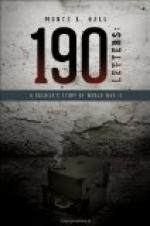After the conflict, those who will have completely and filially fulfilled their obligation to their country will find themselves confronted by duties yet more grave, and the realisation of things that are now impossible. Then will be the time for them to throw their efforts into the future. They must use their energies to wipe out the trace of the shattering contact of nations. The French Revolution, notwithstanding its mistakes, notwithstanding some backsliding in practice, some failure in construction, did none the less establish in man’s soul this fine theory of national unity. Well! the horrors of the 1914 war lead to the unity of Europe, to the unity of the race. This new state will not be established without blows and spoliation and strife for an indefinite time, but without doubt the door is now open towards the new horizon.
To Madame C——.
November 16.
MY DEAR FRIEND,—How much pleasure and comfort your letter gives me, and how your warm friendship sustains my courage!
What you say to me about my mother binds me closer to existence. Thank you for your splendid and constant affection.
. . . What shall I tell you of my life? Through the weariness and the vicissitudes I am upheld by the contemplation of Nature which for two months has been accumulating the emotion and the pathos of this impassioned season. One of my habitual stations is on the heights which overlook the immense Woevre plain. How beautiful it is! and what a blessing to follow, each hour of the day and evening, the kindling colours of the autumn leaves! This frightful human uproar cannot succeed in troubling the majestic serenity of Nature! There are moments when man seems to go beyond anything that could be imagined; but a soul that is prepared can soon perceive the harmony which overlooks and reconciles all this dissonance. Do not think that I remain insensible to the agony of scenes that we behold all too often: villages wiped out by the artillery that is hurled upon them; smoke by day, light by night; the misery of a flying population under shell-fire. Each instant brings some shock straight to one’s heart. That is why I take refuge in this high consolation, because without some discipline of the heart I could not suffer thus and not be undone.
November 17, in the morning.
DEAR MOTHER,— . . . I write to you in the happiness of the dawn over my dear village. The night, which began with rain, has brought us again a pure and glorious sky. I see once more my distant horizons, my peaked hills, the harmonious lines of my valleys. From this height where I stand who would guess that agricultural and peaceful village to be in reality nothing but a heap of ruins, in which not a house is spared, and in which no human being can survive the hell of artillery!
As I write, the sun falls upon the belfry which I see framed in the still sombre tree close beside me, while far away, beneath the last hills, the last swelling of the ground, the plain begins to reveal its precious detail in the rosy and golden atmosphere.




